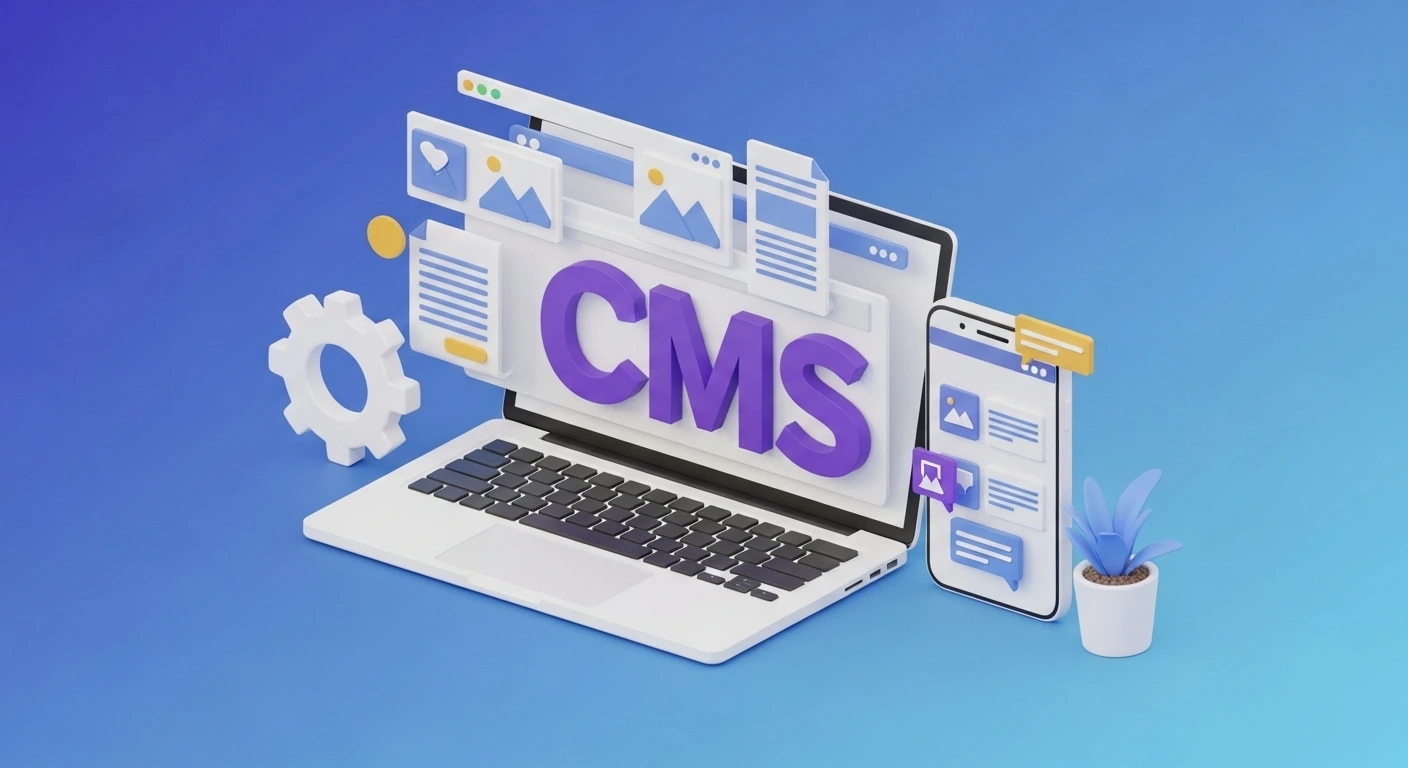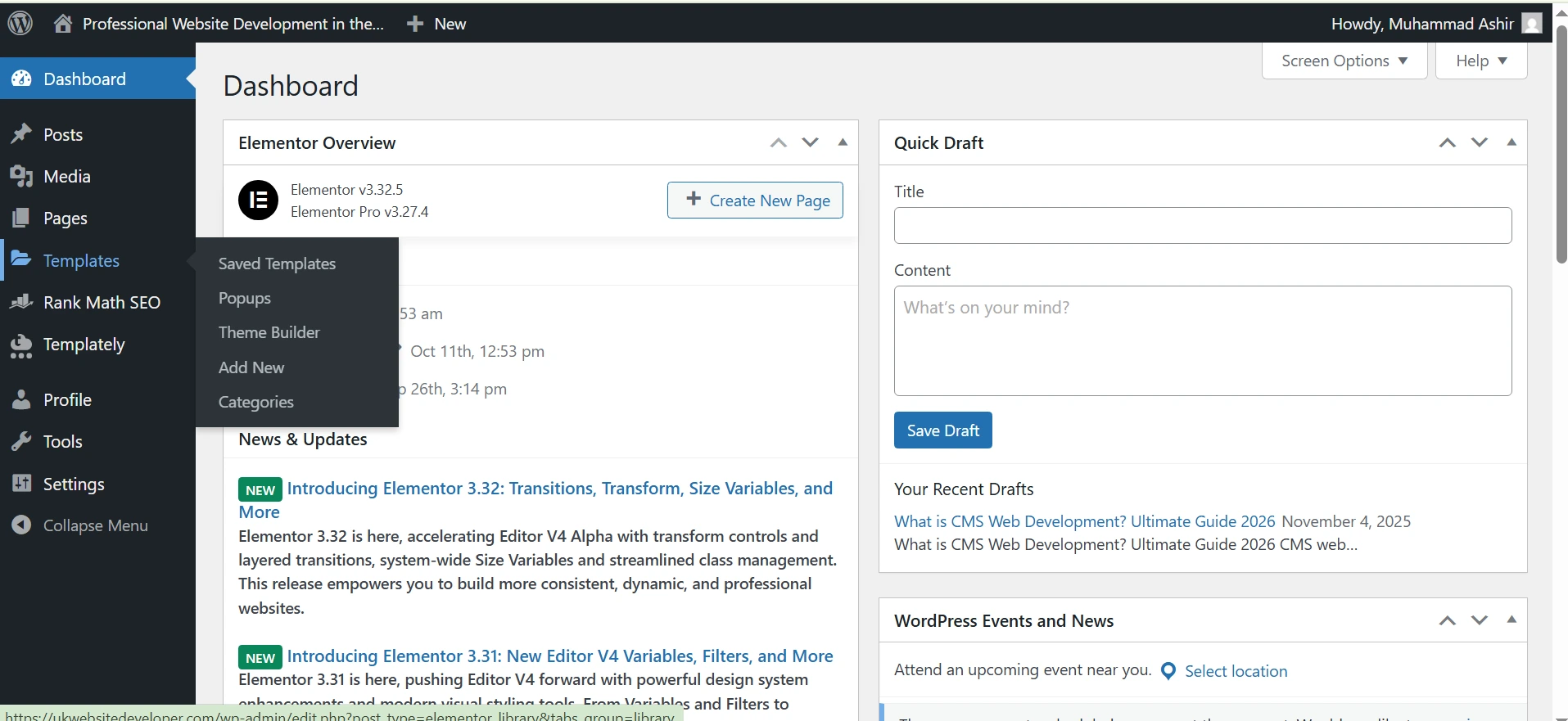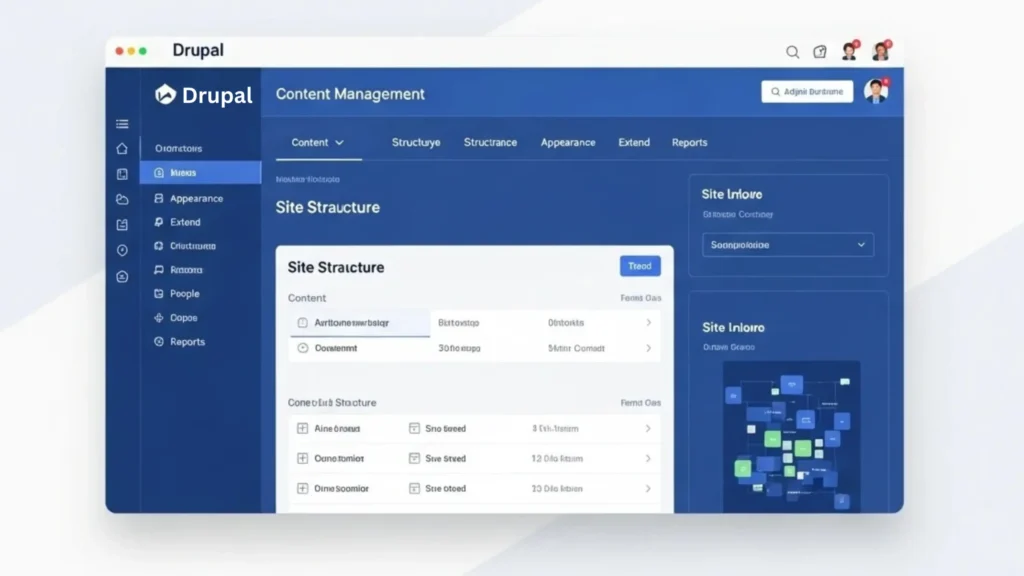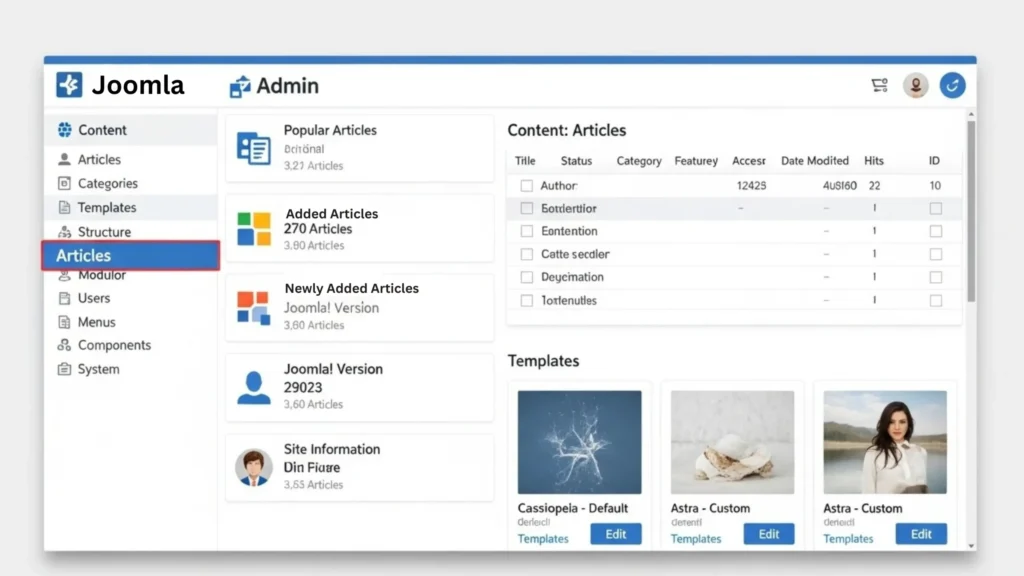Check out
7 Powerful WordPress CRM Tools To Boost Your SalesCMS web development has revolutionized how businesses and individuals create, manage, and maintain their online presence. Everyone can now access digital solutions thanks to content management system websites, which enable users to create expert websites without requiring deep coding knowledge. Knowing how CMS web development operates can change a person’s digital strategy, regardless of how big or small their blog is.

Services from a contemporary CMS web development company provide all-inclusive solutions that blend technical know-how with intuitive user interfaces. Today’s options meet a variety of business needs and technical specifications, ranging from custom CMS web development to e-commerce CMS website development.
A Content Management System (CMS) is a web platform that lets users build, edit, and manage websites without coding. It simplifies digital creation for businesses, developers, and non-technical users alike.
A modern CMS makes web development faster, more secure, and accessible. Whether for startups or enterprises, CMS web development remains the foundation of a scalable and user-friendly digital presence in 2026 and beyond.
Without requiring extensive technical knowledge, a content management system is a software program that lets users create, edit, organize, and publish digital content. By keeping content and design apart, the website content management system enables non-technical users to efficiently manage their websites.
Multiple users can work together on content creation and management in an organized setting with the help of the web content management system (wcms). Because of this strategy, companies all over the world now prefer to develop websites using CMS.
The content management application (CMA) and the content delivery application (CDA) are the two primary components of any CMS-based website build. While the CDA gathers that data and maintains the website, the CMA lets users add and manage content.
While frontend CMS Web development concentrates on how content appears to visitors, CMS backend development manages databases, user authentication, and content storage. This division guarantees seamless CMS platform development for websites.
| CMS Type | Platform | Best For | Starting Price | Notable Users |
|---|---|---|---|---|
Open Source | WordPress | Blogs, Small-Medium Business | $4/month | The New York Times, 40% of all websites |
Open Source | Drupal | Enterprise, Government | Free (hosting only) | Tesla, Australian Government |
Open Source | Joomla | Multi-user Sites | Free (hosting only) | IKEA, 2 million websites |
SaaS/Cloud | Wix | Quick No-Code Sites | $16/month | 200 million users worldwide |
Commercial/SaaS | Shopify | E-commerce Stores | $29/month | Red Bull, 4 million websites |
| Open Source | Magento | Large E-commerce | Free or $22,000/year | Coca-Cola, 250,000+ companies |
Let’s turn your ideas into a stunning website that stands out and drives results.
The most flexibility and control are offered by open source CMS web development options. More than 40% of all websites, including those from well-known companies like The New York Times, use WordPress, making it the industry leader in website development. WordPress allows users to create websites for free, but they must buy hosting and a custom domain.
While the CMS theme marketplace offers thousands of customization options, the CMS plugin ecosystem offers more than 60,000 plugins. It only takes a few minutes to set up a website without a wireframe, and it’s incredibly easy to post or update content.
WordPress Pricing: Personal plan starts at $4/month, Premium at $8/month, Business at $25/month, and eCommerce at $45/month.
Pros:
Cons:

With more than 200 million users globally, Wix has transformed the creation of no-code CMS websites. The drag-and-drop CMS website builder provides hundreds of expert templates, free SSL certificates, and an easy-to-use visual editor.
For freelancers and small businesses, the user-friendly CMS website is ideal. Business and e-commerce premium plans start at $16 and $27 per month, respectively. AI-powered ADI can create fully functional, mobile-friendly CMS websites in a matter of hours.
Pros:
Cons:

Drupal CMS web development caters to more complex requirements, serving over 2 million websites worldwide.
Drupal is chosen by organizations like Tesla and the Australian Government that need enterprise content management (ecm) cms capabilities because of its sophisticated architecture and robust security features. Drupal performs exceptionally well and handles heavy traffic, but it does require some basic coding knowledge.
Drupal Pricing: Users only need to pay for hosting; the open-source code is entirely free.
Pros:
Cons:

Drupal’s intricacy and WordPress’s user-friendliness are balanced in Joomla CMS web development. Joomla is used by more than 2 million websites, including the massive Swedish furniture company IKEA. With more than 10,000 free extensions and templates, the platform is appropriate for social media platforms and multi-user CMS projects that allow for simultaneous content editing.
Joomla Pricing: Free open-source code with hosting costs only.
Pros:
Cons:

Dedicated support and proprietary features are offered by licensed CMS web development. Nearly 4 million websites worldwide, including well-known brands like Red Bull, are served by Shopify CMS web development, which specializes in e-commerce CMS web development. With user-friendly, intuitive interfaces, the platform provides integrated inventory management and payment processing.
Pricing for Shopify: The basic plan costs $29 per month, the standard plan costs $79 per month, and the advanced plan costs $299 per month. Keep in mind that Shopify charges both transaction and app subscription fees.
In addition to hosting, the platform offers round-the-clock customer service through Shopify Academy, email, and chat. Well-known plugins include Wishlists Plus for product bookmarking and Plug In SEO for search engine optimization. Email marketing capabilities are improved by third-party integrations such as Mailchimp.
Pros:
Cons:

Adobe Commerce, formerly known as Magento CMS web development, provides enterprise-level services to more than 250,000 businesses globally, including Coca-Cola. The platform is excellent at managing the demands of content-heavy CMS websites with intricate product catalogs and high levels of customization.
Magento Pricing: Community Edition is free (hosting costs only), while Enterprise Edition starts at $22,000/year.
With default pages like Home and About Us included, the Page Builder feature makes it easy to choose a layout and add content. Although there is a learning curve that is best suited for certified development agencies, the adaptable, open-source platform allows source code modification to meet specific requirements.
Pros:
Cons:

By separating the presentation layer from the content repository, headless CMS web development allows for multichannel CMS delivery across websites, mobile apps, and Internet of Things devices. Better security and performance are provided by this jamstack CMS web development method.
The API-first architecture of the next generation CMS platform lets content managers use recognizable interfaces while developers can utilize their favorite frameworks.
Platforms for user-friendly CMS websites place a high value on streamlined processes and intuitive user interfaces. Anyone can create pages that look professional thanks to the drag and drop CMS website builder functionality, which removes technical barriers.
No code CMS web development has democratized web creation, allowing business owners to maintain their sites without hiring developers for every update. This CMS website editable content capability reduces operational costs significantly.
CMS website dynamic content management enables real-time updates and personalized user experiences. The CMS content upload and page creation process typically involves a simple editor interface similar to word processors.
CMS websites content scheduling on enables users to schedule content publication ahead of time and keep regular posting schedules. Version control for CMS websites version control tracks of modifications and permits rolling back to earlier iterations when necessary.
Without knowing any code, CMS theme customization gives you visual control over how your website looks. By including features like analytics, SEO tools, and contact forms, CMS plugin integration increases functionality.
CMS api integration allows for smooth data transfer between platforms by connecting websites with third-party services. This feature facilitates digital marketing integration for advertising platforms, social media, and email campaigns on CMS websites.
Our team provides tailored CMS solutions to ensure smooth content management and long-term growth.
Compared to custom-coded websites, CMS website cost-effective solutions lower development expenses. Many hosting companies offer one-click installations, making the CMS installation and setup process simple.
Modern platforms are built with mobile-friendly design for CMS websites, guaranteeing responsive layouts on all devices. Smartphone users are given priority in this CMS website’s mobile-first design approach, which reflects current browsing trends.
Without requiring enterprise-level funding, a CMS website for small business operations offers a polished online presence. As business needs change, the scalable architecture of the CMS website adapts to handle more traffic and content.
Complex organizational structures are supported by CMS websites for enterprise settings, which also provide sophisticated user permissions and workflow management. Custom integrations with current business systems are frequently a part of developing a corporate CMS website.
With features for managing donations and organizing volunteers, the CMS website for nonprofits provides reasonably priced solutions. Student portals and learning management integration are offered by CMS websites for the education sector.
Platform developers and security specialists are always updating CMS website security best practices. Frequent updates guard against vulnerabilities, but comparisons between CMS website security vs custom build reveal that each strategy has unique security considerations.
CMS website performance optimization tools monitor loading speeds and suggest improvements. XML sitemaps, meta tag management, and clear URL structures are some of the SEO optimization features of CMS websites.
The best CMS for SEO platforms support SEO plugins and come with integrated optimization tools. Compliance with CMS website accessibility standards guarantees that websites continue to be usable by individuals with disabilities.
Budgetary restrictions, technical know-how, and particular project requirements all influence how to select the best CMS. Control versus convenience is at the heart of the open source vs. commercial CMS controversy.
Comparisons between Drupal and WordPress CMS show Drupal provides more powerful enterprise features, but WordPress excels at being easy to use. Development complexity and deployment flexibility are two factors to consider when comparing headless and traditional CMS.
Hosting, themes, plugins, and maintenance costs should all be included in CMS cost comparisons. A comparison of CMS website scalability analyses how platforms manage increases in functionality, traffic, and content.
Analysis of CMS website flexibility vs. custom code balances the need for certain features against quick deployment. The benefits and drawbacks of CMS websites differ greatly depending on the platform and use case.
A systematic approach to CMS implementation for websites guarantees successful deployment. When choosing a domain and hosting provider for CMS, storage, bandwidth, and technical support must be taken into account.
Planning the site’s structure and content organization is the first step in the CMS website design workflow. The process of customizing a CMS website includes setting up settings, installing plugins, and choosing themes.
Verifying SEO settings, testing functionality, and assessing mobile responsiveness are all part of the CMS website launch checklist. Appropriate backup and restoration protocols for CMS websites guard against data loss.
One major benefit of CMS websites over static ones is their ease of maintenance. Maintenance for CMS websites after launch entails managing backups, keeping an eye on performance, and updating software.
Clients who receive CMS website training are guaranteed to be able to manage their content efficiently. The majority of platforms provide regular security patch and feature enhancement updates for CMS web development.
CMS websites for publishing platforms or blogs are excellent at organizing, classifying, and creating RSS feeds. Reaching audiences around the world with translated content is made possible by CMS websites’ multilingual support.
Voice search-ready optimization for CMS websites enhances discoverability with voice assistants and smart speakers. Websites can become progressive web apps with offline functionality through CMS website pwa integration.
Integration of CMS website analytics yields information about content performance and visitor behavior. Conversion optimization, social sharing, and SEO are supported by the digital marketing-friendly features of CMS websites.
As businesses look for omnichannel content delivery, the headless CMS trend 2026 keeps gaining traction. Artificial intelligence is used in CMS website Ai content integration to provide automated optimization and content recommendations.
The responsive design of CMS websites has advanced beyond simple mobile compatibility to incorporate user context-based and device-capable adaptive experiences. Platform innovation and feature development are fueled by the emphasis on CMS website user experience design.
WordPress is the most commonly used CMS (Content Management System) in the world.
WordPress powers over 40% of all websites on the internet, making it the clear leader in the CMS market. Among websites that use a CMS, WordPress holds an even more dominant position with approximately 65% market share.
No, you don’t need coding skills to use a CMS. Modern CMS platforms like WordPress, Shopify, and Wix offer drag-and-drop interfaces and pre-made themes that allow anyone to build and manage websites without writing code.
A CMS (Content Management System) in web design is software that allows users to create and manage website content without coding. Popular examples include WordPress (used by The New York Times), Shopify (used by Red Bull), Drupal (used by Tesla), and Joomla (used by IKEA) – each enabling easy content updates, page creation, and website management through user-friendly interfaces.
The 4 types of CRM (Customer Relationship Management) are: Operational CRM (manages sales, marketing, and service automation), Analytical CRM (analyzes customer data for insights), Collaborative CRM (shares customer information across departments), and Strategic CRM (focuses on long-term customer relationships and retention).
CMS web development service providers keep improving their products to satisfy the demands of the ever-evolving digital landscape. Modern platforms provide strong, user-friendly tools for creating and maintaining an online presence, whether you’re creating a personal blog or a complex enterprise solution. Successful CMS website design and development projects that provide long-term value are ensured by being aware of the options available and adhering to best practices.